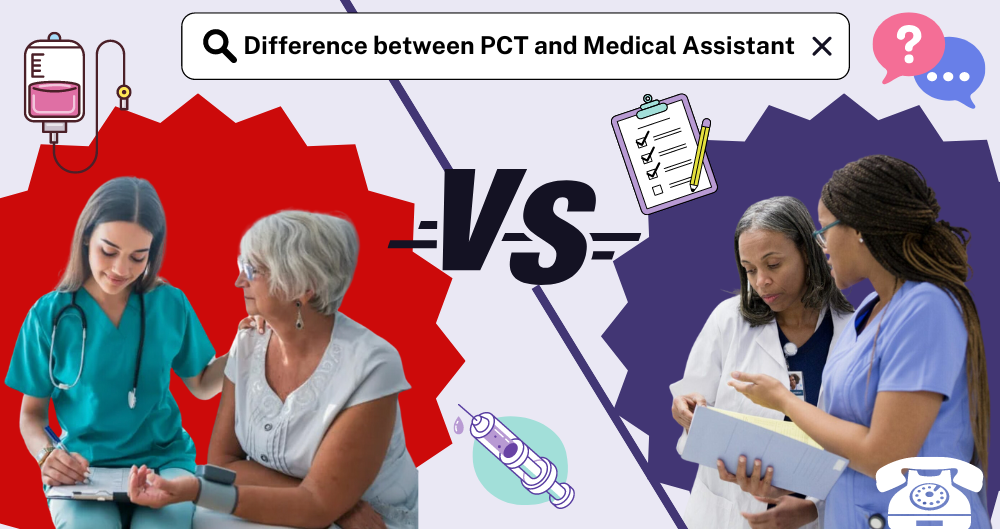PCT vs Medical Assistant: Which is Better for You?

If you're looking to jumpstart a career in healthcare, you’ve likely come across these two roles: Patient Care Technician (PCT) and Medical Assistant (MA). While both provide hands-on patient support, they vary in scope of practice, training, and growth opportunities. Below, we’ll detail how they differ, what you can expect from each path, and where to find the training you need—citing both Dreambound for classes as well as .gov and .edu sites for reliable information.
PCT (Similar to Nursing Assistants)
- Median Annual Wage (May 2023): ~$38,130 (about $18.33/hour)
- Projected Growth (2023–2033): ~4% (steady, slightly below average compared to some healthcare roles)
Medical Assistant
- Median Annual Wage (May 2023): ~$42,000 (about $20.19/hour)
- Projected Growth (2023–2033): ~15% (much faster than average)
Why Growth Is High for MAs? An aging population plus more outpatient care centers mean more front-office, clinical, and administrative needs—areas MAs excel in.
PCT vs. MA: Which One Should You Pick?
-
Go PCT If…
- You want a quick, cost-effective route into the hospital/bedside care environment
- You plan to advance later to LPN (Licensed Practical Nurse) or RN programs, using PCT experience as a stepping stone
- You thrive on direct patient interaction and hands-on tasks
-
Go MA If…
- You enjoy a mix of clinical and administrative duties
- You’re comfortable working in physician offices, clinics, or outpatient settings
- You aim for slightly higher pay and want to explore multiple roles (front-desk, clinical aide, etc.)
Either choice provides valuable patient care experience and sets you on a rewarding healthcare path. It really depends on whether you feel at home supporting patients at the bedside all day or balancing clinical tasks with office responsibilities.
Frequently Asked Questions (FAQ)
Which Is Better, PCT or Medical Assistant?
They serve different purposes. PCTs do more hands-on care in settings like hospitals or skilled nursing. MAs balance clinical tasks (vitals, injections) and office tasks (billing, scheduling). Your choice depends on your desired work environment and career goals.
Where Does a PCT Make the Most Money?
Wages vary by region. States with higher costs of living (e.g., California, New York) often pay PCTs more. Check your state’s labor department or BLS data for updated wage info.
What Is Another Name for a Patient Care Technician?
Titles like Patient Care Associate (PCA) or Patient Care Assistant may be used interchangeably, but responsibilities can differ. Some facilities also call them Nurse Aides with extra technical skills.
Is a Medical Assistant the Same as a Tech?
Not exactly. While MAs can perform certain “technical” procedures, they also handle administrative tasks like scheduling and billing. A “tech” role typically focuses on one specialized area rather than a broad blend of administrative and clinical.
Is PCA the Same as PCT?
They’re very similar, often with overlapping duties in patient care. PCT may require additional training like EKG or phlebotomy, whereas PCA is more akin to a CNA-focused role without those advanced skills.
Is PCT a Stressful Job?
It can be. Direct patient care can involve emotional moments, physically demanding shifts, and unpredictable situations. On the bright side, it’s also incredibly rewarding to help patients during critical times.
What Is the Best Job as a Medical Assistant?
Many MAs enjoy specialized roles in fields like podiatry, pediatrics, or cardiology. Some of the highest paying MA jobs involve office management or assisting with specialized procedures. The best job depends on your interests and the demand in your area.
Conclusion
Both Patient Care Technicians and Medical Assistants fill vital roles in healthcare, bridging gaps between patients and the broader medical team. PCTs lean more on hands-on patient care (shorter training, lower cost), while MAs split their time between clinical and administrative tasks (slightly longer training, potentially higher pay). Whichever path you choose, make sure to verify your state’s regulations, enroll in an accredited program, and consider getting certified for better job prospects.
- Ready to begin? Explore PCT or MA classes on Dreambound for convenient local or online options.
- Research your region: Check official state .gov sites or local community college (.edu) pages for recognized programs.
No matter which path you pick, you’ll be on the front lines of patient care—making a real impact on people’s lives every day.
Published in accordance with BLS.gov data and references to relevant .gov/.edu sites for training and licensing information.

Athena is Co-founder and CEO of Dreambound.




